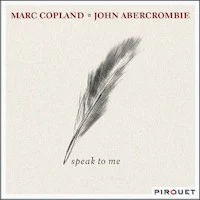Styles: Jazz, Post Bop
Year: 2009
File: MP3@320K/s
Time: 58:06
Size: 133,7 MB
Art: Front
(4:21) 1. All Blues
(2:22) 2. The Wanderer
(6:23) 3. Blue in Green
(2:42) 4. Rush Hour
(6:44) 5. River's Run
(2:21) 6. Matterhorn
(4:17) 7. The Pond
(6:47) 8. Goes out Comes In
(2:25) 9. Late Night
(7:24) 10. Cavatina
(4:53) 11. In Your Own Sweet Way
(3:43) 12. Benediction
(3:36) 13. Sweet and Lovely
Insight
Year: 2009
File: MP3@320K/s
Time: 58:06
Size: 133,7 MB
Art: Front
(4:21) 1. All Blues
(2:22) 2. The Wanderer
(6:23) 3. Blue in Green
(2:42) 4. Rush Hour
(6:44) 5. River's Run
(2:21) 6. Matterhorn
(4:17) 7. The Pond
(6:47) 8. Goes out Comes In
(2:25) 9. Late Night
(7:24) 10. Cavatina
(4:53) 11. In Your Own Sweet Way
(3:43) 12. Benediction
(3:36) 13. Sweet and Lovely
Gary Peacock and pianist Marc Copland have been working together for nearly 20 years, though most often in a trio setting. Peacock was Copland's bassist of choice on two of his New York Trio Recordings trilogy sets Modhina (2006) and Voices (2007), both on the German Pirouet label. But for a pianist who mines dark, impressionistic yet subtly romantic places, the most intimate of settings is the duo, and this pair's first (and, until now, only) duet recording, What It Says (Sketch, 2004), was a remarkable demonstration of profound interaction and sublime beauty. The two reunite for Insight, with Peacock's name first on the marquee, though it's likely nothing more than the egalitarian nature of this duo that his name is first, since Copland's was the lead on What It Says. It's another set of deeply connected music a mix of Copland and Peacock originals, free improvisations and well-known but instinctively personal covers. It may or may not be a coincidence that two tunes from Miles Davis' Kind of Blue (Columbia, 1959) are played, opening with a version of "All Blues" that's bright in tempo but tenebrously indigo in ambience. He possesses unmistakable roots in Bill Evans, the primary pianist on Davis' iconic recording, but Copland's voicings are more abstract and even more impressionistic, running both in tandem and in contrast with Peacock's relentlessly frenetic bass line. "Blue in Green" is even more subdued, though Peacock takes a solo that's one of his best on the album, an endless wellspring of thematic invention.
Peacock's highest profile gig is with Keith Jarrett's Standards Trio, but while it's an unequivocally creative place to be, he feels more open-ended here, especially during the five spontaneous compositions he creates with Copland. The act of not playing is as active a participating action as playing, and on "The Wanderer," he doesn't even enter until the song's final 25 seconds, but it grounds Copland's repetitive, gradually solidifying pattern, despite doing nothing more than following the pianist's right hand. He's more actively engaged on "Rush Hour," a kinetic free improv about two voices merging as one. Copland revisits his own brooding blues, "River's Run," heard solo on his remarkable Time Within Time (Hatology, 2005) and on Voices; here, Peacock provides a more definitive pulse while interacting contrapuntally with Copland. Peacock solos initially, between Copland's rippling, cued figures on "The Pond" with Copland taking over to introduce delicately elegant cascading lines without ever losing sight of the song's core.
The duo is at its most direct during the intro to Stanley Myers' melancholic "Cavatina," the theme song to Michael Cimono's classic The Deer Hunter (1978), but ultimately dissolves into freer time, again still respecting the song's essence. It's their innate ability to head into uncharted territory while remaining reverential to their source that makes Peacock and Copland such a compelling duo. A clear window into the improvisational mindset, Insight is another high water mark for both of these fine, interpretive, and consistently inventive musicians.~ John Kelman https://www.allaboutjazz.com/insight-gary-peacock-pirouet-records-review-by-john-kelman.php
Personnel: Gary Peacock: bass; Marc Copland: piano.
Gary Peacock (R.I.P)
Born: 12-05-1935
Died: 05-09-2020
Peacock's highest profile gig is with Keith Jarrett's Standards Trio, but while it's an unequivocally creative place to be, he feels more open-ended here, especially during the five spontaneous compositions he creates with Copland. The act of not playing is as active a participating action as playing, and on "The Wanderer," he doesn't even enter until the song's final 25 seconds, but it grounds Copland's repetitive, gradually solidifying pattern, despite doing nothing more than following the pianist's right hand. He's more actively engaged on "Rush Hour," a kinetic free improv about two voices merging as one. Copland revisits his own brooding blues, "River's Run," heard solo on his remarkable Time Within Time (Hatology, 2005) and on Voices; here, Peacock provides a more definitive pulse while interacting contrapuntally with Copland. Peacock solos initially, between Copland's rippling, cued figures on "The Pond" with Copland taking over to introduce delicately elegant cascading lines without ever losing sight of the song's core.
The duo is at its most direct during the intro to Stanley Myers' melancholic "Cavatina," the theme song to Michael Cimono's classic The Deer Hunter (1978), but ultimately dissolves into freer time, again still respecting the song's essence. It's their innate ability to head into uncharted territory while remaining reverential to their source that makes Peacock and Copland such a compelling duo. A clear window into the improvisational mindset, Insight is another high water mark for both of these fine, interpretive, and consistently inventive musicians.~ John Kelman https://www.allaboutjazz.com/insight-gary-peacock-pirouet-records-review-by-john-kelman.php
Personnel: Gary Peacock: bass; Marc Copland: piano.
Gary Peacock (R.I.P)
Born: 12-05-1935
Died: 05-09-2020
Insight




















